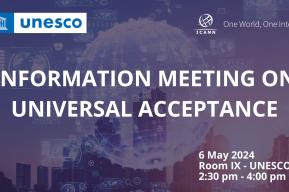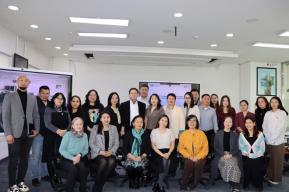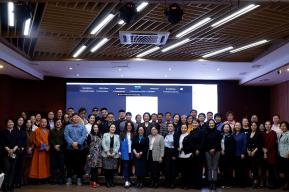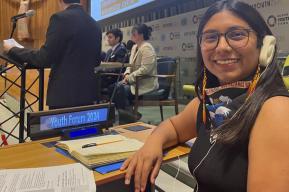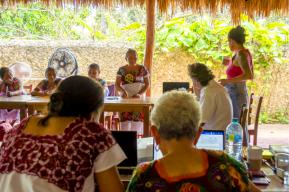News
'Responding to violent extremism' -- Irina Bokova at King's College London

On 3 February, 2016, the UNESCO Director-General gave a lecture at King's College London, on the theme of “Culture under Attack – Responding to Violent Extremism.”
The lecture was held in the historic Maughan Library, hosted by Professor Theo Farrell, Department of War Studies, gathering officials, academics, media, researchers and students.
“Culture has always been the victim of war --What we see today is new,” said Irina Bokova. “All of this is part of the same deliberate strategy, which I call ‘cultural cleansing.’ Never before in recent history have we seen such systematic attacks against cultural heritage and diversity, as a tactic of war."
The Director-General exposed the scale of destruction in Syria and Iraq, including through systemic looting of sites and cultural goods. This is accompanied by massive violations of human rights and attacks against cultural diversity in the religion.
“The two processes – attacking people, destroying heritage -- go together.”
Irina Bokova noted the alarming rise of youth radicalisation, led forward also through a global media campaign of hatred and violent extremism.
“Today, there are 30,000 foreign terrorist fighters in Syria and Iraq, in Afghanistan, Libya and Yemen.”
The Director-General made the stakes clear.
“This is about identities and belonging, protecting values from the past that are important today and tomorrow, for reconciliation. This is about culture as a force of resilience, a source of strength to rebuild – and this is why I believe safeguarding cultural heritage is today a security and peacebuilding imperative.”
In response, Irina Bokova pointed to the several directions of action – starting with action to fight against the illicit trafficking of cultural objects from Iraq and Syria. She underlined the importance of United Nations Security Council Resolution 2199, banning cultural trade from Iraq and Syria, under Chapter VII of the Charter, with UNESCO leading its implementation with partners.
Second, the Director-General highlighted the need for stronger preventive actions.
“Today, in Iraq and Syria, ordinary citizens and museum professionals – modern-day ‘monument men and women’-- are risking their lives to protect their culture,” she said. “They need support – in Syria, Iraq, across the region, UNESCO is building capacity in preventive conservation, emergency risk management, improving inventories.”
Irina Bokova pointed to the need for bolstered international cooperation across the board – noting that UNESCO has launched a global coalition to strengthen coordination between all key partners, including armed forces, Interpol, the World Customs Organization, museums and the art market.
Lastly, Irina Bokova underlined the need to counter the propaganda of violent extremism, especially with young women and men, through global citizenship education, media and information literacy, skills for intercultural dialogue and opportunities for civic engagement
“I see this as the new frontline today -- in conflict situations, in refugee camps, in societies across the world,” she said, noting this was also UNESCO’s message to 2016 Syria Conference, being held on 4 February, 2016 in London.
In ending, the Director-General recalled the historic leadership of the United Kingdom in shaping the ‘soft power’ of UNESCO.
“The stakes are high -- but we can act, as we have in the past, “she said. “UNESCO helped save the temples of Nubia, in Egypt. UNESCO rebuilt the old bridge of Mostar. In 2013. Last year, on 18 July, 2015, I returned to Timbuktu, to celebrate UNESCO rebuilding all 14 mausoleums, with local leaders and communities.”
“This matters for each of us, because cultural cleansing is an attack on the humanity we all share."
“This is what we are fighting for.”
Prior to the Lecture, the Director-General met with the Principal of King's College London, Professor Ed Byrne.
On the same day, the Director-General visited the Victoria and Albert Museum, at the invitation of Dr Martin Roth, Director of the Museum, to discuss cooperation.


